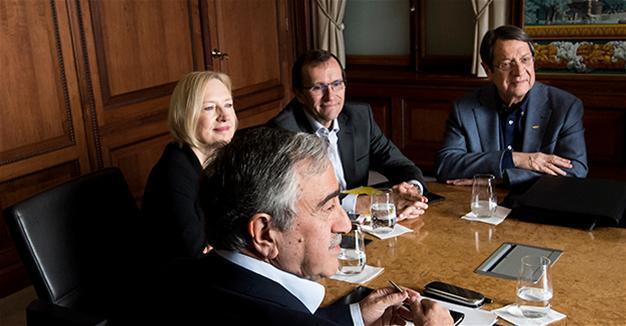‘Bottleneck’ in Cyprus peace talks in Switzerland: Report
MONT PELERIN, Switzerland

AP photo
The first day of the second round of U.N.-mediated peace talks on the Cyprus issue in Switzerland on Nov. 20 failed to outline concrete steps to resolve the dispute, Turkey’s state-run Anadolu Agency cited a diplomatic source as saying on Nov. 21.
The failure of the Greek Cypriot and the Greek sides to take a clear stance on issues to which the guarantor countries, including Turkey, Greece and the U.K. could agree, has brought the negotiations to a bottleneck, said the source, who declined to be named due to restrictions on talking to the media.
The two-day negotiation process in the Swiss town of Mont Pelerin is being overseen by the U.N.’s Special Envoy on Cyprus, Espen Barth Eide, in an effort to resolve one of the world’s longest-running political dilemmas.
Turkish and Greek Cypriot leaders are trying to reach a final agreement that could see the island reunified after four decades of division.
Turkish President Recep Tayyip Erdoğan and Greek Prime Minister Alexis Tsipras held a telephone conversation late Nov. 18, during which the two leaders discussed the possibility of the quintet conference, with the inclusion of Turkey, Greece and the U.K. as guarantor powers, daily Hürriyet reported on Nov. 20.
The Greek and Greek Cypriot sides reportedly said that Dec. 7, 19 and 29 are suitable dates to hold the five-party summit.
During the current round of Swiss talks on Nov. 20, territorial changes were not discussed but guarantees topped the agenda, according to the source.
The second day of round two of the talks was set to begin later on Nov. 21.
Turkish Cypriot President Mustafa Akıncı and Greek Cypriot leader Nicos Anastasiades had met in Mont Pelerin for the first round of talks earlier this month between Nov. 7 and Nov. 11. They returned to the town on Nov. 20 to tackle the territorial adjustments needed for an anticipated two-state federation, but the two leaders declined to shake hands for photographers at the start of their latest talks.
The issue of territory is seen as one of the most intractable on the agenda.
Although the two leaders are said to have come close to agreeing the amount of territory that should be run by the Turkish Cypriot government, there are still disputes over which towns and villages should be included.
Any agreement will mean redrawing existing boundaries and potentially moving thousands of residents from their current homes, 42 years after many were displaced when the island was first split.
If a deal is reached on territorial changes, negotiators are expected to announce a date for a final quintet summit between the Turkish and Greek Cypriot leaders and the three other states involved in the process: Turkey, Greece, and the U.K.
That meeting will focus on security, particularly the presence of 30,000 Turkish troops that remain based on the island after a 1974 military coup was followed by Turkey’s intervention as a guarantor power.
Reunification discussions resumed in May 2015, and both sides have repeatedly expressed optimism that a solution would be found by the end of this year.
Once a final agreement is reached, it will be put to both communities in a referendum. A previous peace deal was approved by Turkish Cypriots in 2004 but rejected by Greek Cypriot voters.
